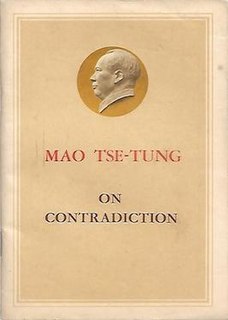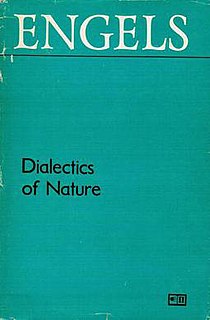Materialism is a form of philosophical monism which holds matter to be the fundamental substance in nature, and all things, including mental states and consciousness, are results of material interactions. According to philosophical materialism, mind and consciousness are by-products or epiphenomena of material processes, without which they cannot exist. This concept directly contrasts with idealism, where mind and consciousness are first-order realities to which matter is subject and material interactions are secondary.
Dialectic, also known as the dialectical method, is a discourse between two or more people holding different points of view about a subject but wishing to establish the truth through reasoned argumentation. Dialectic resembles debate, but the concept excludes subjective elements such as emotional appeal and the modern pejorative sense of rhetoric. Dialectic may thus be contrasted with both the eristic, which refers to argument that aims to successfully dispute another's argument, and the didactic method, wherein one side of the conversation teaches the other. Dialectic is alternatively known as minor logic, as opposed to major logic or critique.

In traditional logic, a contradiction occurs when a proposition conflicts either with itself or established fact. It is often used as a tool to detect disingenuous beliefs and bias. Illustrating a general tendency in applied logic, Aristotle's law of noncontradiction states that "It is impossible that the same thing can at the same time both belong and not belong to the same object and in the same respect."

German philosophy, here taken to mean either (1) philosophy in the German language or (2) philosophy by Germans, has been extremely diverse, and central to both the analytic and continental traditions in philosophy for centuries, from Gottfried Wilhelm Leibniz through Immanuel Kant, Georg Wilhelm Friedrich Hegel, Arthur Schopenhauer, Karl Marx, Friedrich Nietzsche, Martin Heidegger and Ludwig Wittgenstein to contemporary philosophers. Søren Kierkegaard, a Danish philosopher, is frequently included in surveys of German philosophy due to his extensive engagement with German thinkers.

Economic determinism is a socioeconomic theory that economic relationships are the foundation upon which all other societal and political arrangements in society are based. The theory stresses that societies are divided into competing economic classes whose relative political power is determined by the nature of the economic system.
Philosophy in the Soviet Union was officially confined to Marxist–Leninist thinking, which theoretically was the basis of objective and ultimate philosophical truth. During the 1920s and 1930s, other tendencies of Russian thought were repressed. Joseph Stalin enacted a decree in 1931 identifying dialectical materialism with Marxism–Leninism, making it the official philosophy which would be enforced in all Communist states and, through the Comintern, in most Communist parties. Following the traditional use in the Second International, opponents would be labeled as "revisionists".

On Contradiction is a 1937 essay by the Chinese Communist revolutionary Mao Zedong. Along with On Practice it forms the philosophical underpinnings of the political ideology that would later become Maoism. It was written in August 1937, as an interpretation of the philosophy of dialectical materialism, while Mao was at his guerrilla base in Yan'an. Mao suggests that all movement and life is a result of contradiction. Mao separates his paper into different sections: the two world outlooks, the universality of contradiction, the particularity of contradiction, the principal contradiction and principal aspect of contradiction, the identity and struggle of aspects of contradiction, the place of antagonism in contradiction, and finally the conclusion. Mao further develops the theme laid out in On Contradiction in his 1957 speech On the Correct Handling of Contradictions Among the People.
Dialectical and Historical Materialism, by Joseph Stalin, is a central text within the Soviet Union's political theory Marxism–Leninism.

Marxist humanism is an international body of thought and political action rooted in an interpretation of the works of Karl Marx. It is an investigation into "what human nature consists of and what sort of society would be most conducive to human thriving" from a critical perspective rooted in Marxist philosophy. Marxist humanists argue that Marx himself was concerned with investigating similar questions.
Marxist–Leninist atheism, also known as Marxist–Leninist scientific atheism, is the irreligious and anti-clerical element of Marxism–Leninism, the official state ideology of the Soviet Union. Based upon a dialectical-materialist understanding of humanity's place in nature, Marxist–Leninist atheism proposes that religion is the opium of the people; thus, Marxism–Leninism advocates atheism, rather than religious belief.

Classical Marxism refers to the economic, philosophical and sociological theories expounded by Karl Marx and Friedrich Engels as contrasted with later developments in Marxism, especially Marxism–Leninism.

The Economic and Philosophic Manuscripts of 1844, also referred to as the Paris Manuscripts or as the 1844 Manuscripts, are a series of notes written between April and August 1844 by Karl Marx, published posthumously in 1932.

Marxist historiography, or historical materialist historiography, is an influential school of historiography. The chief tenets of Marxist historiography include the centrality of social class, social relations of production in class-divided societies that struggle against each other, and economic constraints in determining historical outcomes. Marxist historians follow the tenets of the development of class-divided societies, especially modern capitalist ones.

Marxist philosophy or Marxist theory are works in philosophy that are strongly influenced by Karl Marx's materialist approach to theory, or works written by Marxists. Marxist philosophy may be broadly divided into Western Marxism, which drew from various sources, and the official philosophy in the Soviet Union, which enforced a rigid reading of Marx called dialectical materialism, in particular during the 1930s. Marxist philosophy is not a strictly defined sub-field of philosophy, because the diverse influence of Marxist theory has extended into fields as varied as aesthetics, ethics, ontology, epistemology, theoretical psychology and philosophy of science, as well as its obvious influence on political philosophy and the philosophy of history. The key characteristics of Marxism in philosophy are its materialism and its commitment to political practice as the end goal of all thought. The theory is also about the struggles of the proletariat and their reprimand of the bourgeoisie.
Chinese Marxist philosophy is the philosophy of dialectical materialism that was introduced into China in the early 1900s and continues in the Chinese academia to the current day.

Dialectical materialism is a philosophy of science, history, and nature developed in Europe and based on the writings of Karl Marx and Friedrich Engels. Marxist dialectics, as a materialist philosophy, emphasizes the importance of real-world conditions and the presence of contradictions within things, in relation to but not limited to class, labor, and socioeconomic interactions. This is in contrast to the idealist Hegelian dialectic, which emphasizes the observation that contradictions in material phenomena could be resolved by analyzing them and synthesizing a solution whilst retaining their essence. Marx supposed that the most effective solution to the problems caused by said contradictory phenomena was to address and rearrange the systems of social organization at the root of the problems.

Anti-Dühring is a book by Friedrich Engels, first published in German in 1878. It had previously been serialised in the newspaper Vorwärts. There were two further German editions in Engels' lifetime. Anti-Dühring was first published in English translation in 1907.

Dialectics of Nature is an unfinished 1883 work by Friedrich Engels that applies Marxist ideas – particularly those of dialectical materialism – to nature.

Historical materialism is the term used to describe Karl Marx's theory of history. Marx locates historical change in the rise of class societies and the way humans labor together to make their livelihoods. For Marx and his lifetime collaborator, Engels, the ultimate cause and moving power of historical events are to be found in the economic development of society and the social and political upheavals wrought by changes to the mode of production. Historical materialism provides a challenge to the view that historical processes have come to a close and that capitalism is the end of history. Although Marx never brought together in one published work a systemic or comprehensive description of historical materialism, his key ideas are woven into variety of works from the 1840s onward. Since Marx's time, the theory has been modified and expanded. It now has many Marxist and non-Marxist variants.

The following outline is provided as an overview of and topical guide to Marxism:








